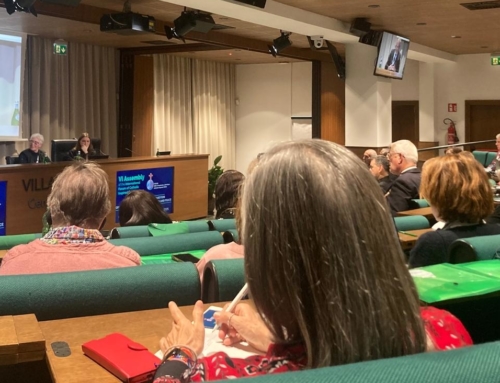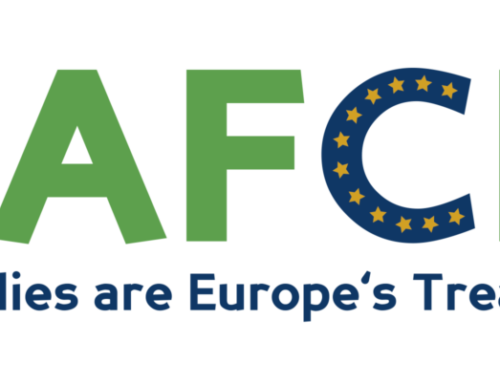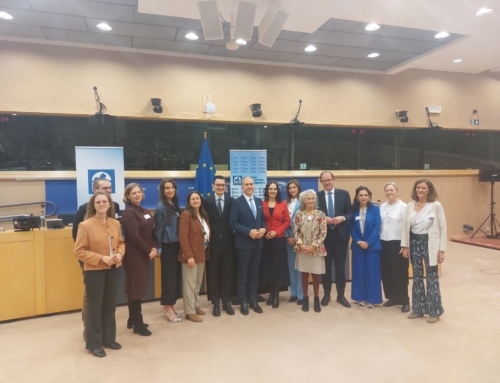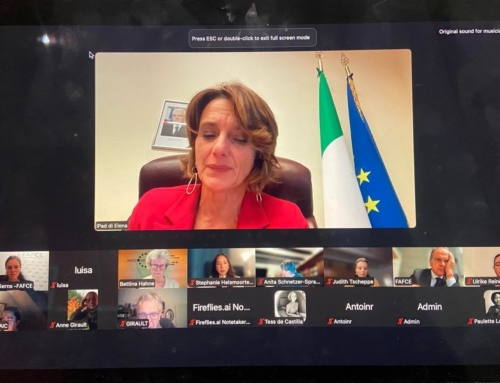14th of March 2023
Long-term changes are having a profound effect on the lives of Europeans. The European Commission therefore includes in its work an effort to embed strategic foresight: “Foresight is the discipline of exploring, anticipating and shaping the future to help building and using collective intelligence in a structured, and systemic way to anticipate developments“.
FAFCE contributed to a public consultation of the European Commission on the 2023 Strategic Foresight Report. This initiative “focuses on the future of the EU’s social and economic sustainability” and aims to ensure that by 2050 Europe’s ability to achieve sustainability is strengthened, as well as EU’s global leadership.
FAFCE contribution brings attention to the demographic challenges and highlights their significance for the future of Europe. As the goal of the Commission’s initiative is “to support the transition to a greener, more sustainable and fairer EU”, FAFCE calls for the recognition of the role of families, as guarantees of Europe’s future and urges to include the demographic transition together with the twin green and digital transitions. The 2023 Strategic Foresight Report will also take a closer look at the opportunities and challenges that determine the social and economic well-being of future generations and will tackle, among others, the issue of intergenerational fairness. FAFCE in the contribution underlines both the importance of investing in intergenerational solidarity to leave no one behind and the value of supporting new forms of work that favour the family-work life balance of parents.
FAFCE contribution to the European Commission’s call for evidence on the « 2023 Strategic Foresight Report »
FAFCE welcomes the initiative of the European Commission on a Strategic Foresight Report for 2023, which will “aim to provide guidance on strategic decisions to be made to ensure that the EU remains socially and economically sustainable and develops a stronger global role in the coming decades”. FAFCE supports the Commission’s commitment to meet the social, economic and environmental challenges of Europe in the coming decades.
Our Federation would like to the Commission’s attention bring four policy recommendations:
Recognise the role of families as guarantees of Europe’s future
Our Federation stresses the role demonstrated by families during the pandemic, who filled the gaps that public services were unable to provide for, such as childcare, long-term care, education, and overall maintained social cohesion in a context of social isolation.
FAFCE recalls that the family provides a fundamental contribution to the general welfare. We invite the EU decision-makers to recognise the family as the main driver of sustainability in all its aspects, i.e. socially, economically and environmentally. “Public policies will only be sustainable if families are recognised and valued as a resource of primary importance, resulting in a special attention given to the freedom of families to pursue, in the best possible conditions and without obstacles, their joyful responsibility to care for the integral development of their children and overall of their community, in a positive dialogue between generations”. (FAFCE 2021 Fall Board Resolution, “Families for Sustainable and Integral Development”, 21 October 2021).
FAFCE calls the EU decision-makers to regard family policies as an investment in the future, rather than mere public expenditures.
Include the demographic transition together with the twin green and digital transitions
FAFCE invites European institutions and national governments to consider the European demographic crisis with the same attention given to the digital and green transitions. Indeed, it is not possible to think about sustainability without a next generation to uphold it.
Our Federation expresses deep concerns about the fertility rate in Europe of 1,53 children per women in 2019;[1] and the disastrous impact of the demographic unbalance on social and pension systems, labour market dynamism, economic sustainability and social cohesion. Couples still face many economic, social and cultural obstacles in their wish to start a family and to have children. On average, couples in Europe have overall one child less that they would want to.[2] We note that the promotion of a culture of life, where children are welcomed, does not seek to impose on parents to have more children, but rather seeks to allow the freedom and the conditions for parents to have the number of children they desire.
Moreover, FAFCE recalls that the fact of having children should never be considered as a lack of responsibility towards the Creation or its natural resources. The concept of “environmental footprint” cannot be applied to children, since they are an indispensable resource for the future. Instead, consumerism and individualism should be addressed, looking at families as the best example of the optimisation of resources involving large economies of scale.
FAFCE calls for effective demographic and family policies to generate a demographic spring, taking the example from the national good practices, as highlighted by the FAFCE Dialogues on demographic challenges.[3] Family and demographic policies shall ensure that public policies do not interfere with parents’ personal commitment and desire to develop their families.
Invest in intergenerational solidarity to “leave no one behind”
By 2070, 30% of people in Europe are estimated to be aged 65 and above, up from about 20% today. From 2019 until 2070, the share of people aged 80 or over is projected to more than double.[4] FAFCE recalls the positive and crucial role that elderly people have in our communities. The Covid-19 pandemic has shown many hidden vulnerabilities of our long-term care systems. However, it also created a real awareness of the “richness of many years of life” as a treasure to be valued and protected.
Our Federation however observes cultural and economic obstacles affecting the development of real networks of solidarity. “In the EU, 15 % of women and 10 % of men are involved in informal care for older persons and/or persons with disabilities several days a week or every day. Among informal carers, 42 % of women and 56% of men are working.”[5] Families play a crucial role in taking care of their dependent relatives. This unpaid work is work, and constitutes a win-win action for our communities as it is performed for free and with an attention on quality. In economic terms, it represents a positive externality for the economy and the society overall. It is crucial to recognise the value of informal long-term care as a type of work and consider it in labour and family policies.
FAFCE also calls the EU institutions to support the development of a flexible and diversified long-term care system: support families care for a relative at home with ‘family custody’ and foster care for older people, promote innovative community-oriented solutions to maintain elder’s social inclusion, and ensure access to affordable and quality institutional long-term care.
Support new forms of work that favour the family-work life balance of parents
Health and population trends should also be considered when tackling sustainability, especially within the adequation between employment and family life.
Today’s family-work life balance remains a struggle when it comes to the mental health of parents and families. Domestic work and family responsibilities continue to still be considered as secondary to professional work, and are expected to be performed during the free time. Parents’ unpaid work must be valued and supported with concrete actions: extension of the eligibility to maternity and paternity leave and parental leave (in Europe, half of parents are constrained to come back to work full-time with no flexible working arrangements),[6] more access to childcare services and flexible working arrangements, and the recognition of the value of unpaid family work as a particular category of work (recognition of the soft skills acquired within the family, eased return to the labour market, pension entitlements).
The re-organisation of work following the lockdown, beyond the big difficulties it created for many parents, demonstrated new possibilities for workers to work from home, which is to be stressed. Arrangements for parents to work from home and with flexible working hours are possible and need to be pushed forward, yet in the strict respect of the right to disconnect.
In addition, our Federation wishes to draw attention to the difficult situation of working mothers, as highlighted by the FAFCE-NWFE White Paper on “Protecting Women from Maternal Mobbing”.[7] Indeed, the gender pay gap is not significant for women in their 20s and younger[8], but increases between the age of 25 and 35, coinciding with the average age of birth of the first child. Gender pay gap is mostly a “motherhood pay gap”, resulting from career breaks or discriminatory behaviours towards mothers or women who wish to have children. Working mothers should be ensured the same access to the above-mentioned concrete actions of family-friendly working arrangements. Overall, couples should be ensured the freedom to adapt on their family work-life balance on their own terms.
[1] Eurostat, “Fertility statistics” (March 2021). Available at https://ec.europa.eu/eurostat/statistics-explained/index.php?title=Fertility_statistics
[2] Cf. for example: FAFCE, “Decreasing birth rates in Europe: is it really the choice of parents?” (10 March 2021). Available at https://www.fafce.org/decreasing-birth-rates-in-europe-is-it-really-the-choice-of-parents/#_ftn6
[3] FAFCE, list of FAFCE Dialogues from December 2020 to September 2021. Available at https://www.fafce.org/?s=FAFCE+Dialogue
[4] European Commission Report on the Impact of Demographic Change, p. 10
[5] Cf. 2019 EIGE Thematic Focus on Work-Life Balance.
[6] European Institute for Gender Equality, Gender Equality Index 2019 Work-life balance, 2019, p.16.
[7] New Women for Europe, “Protecting women from maternal mobbing” (11 February 2021). Available at https://www.fafce.org/fafce-nwfe-white-paper-on-protecting-women-from-maternal-mobbing/
[8] https://www.weforum.org/agenda/2022/05/reduce-motherhood-penalty-gender-pay-gap/







